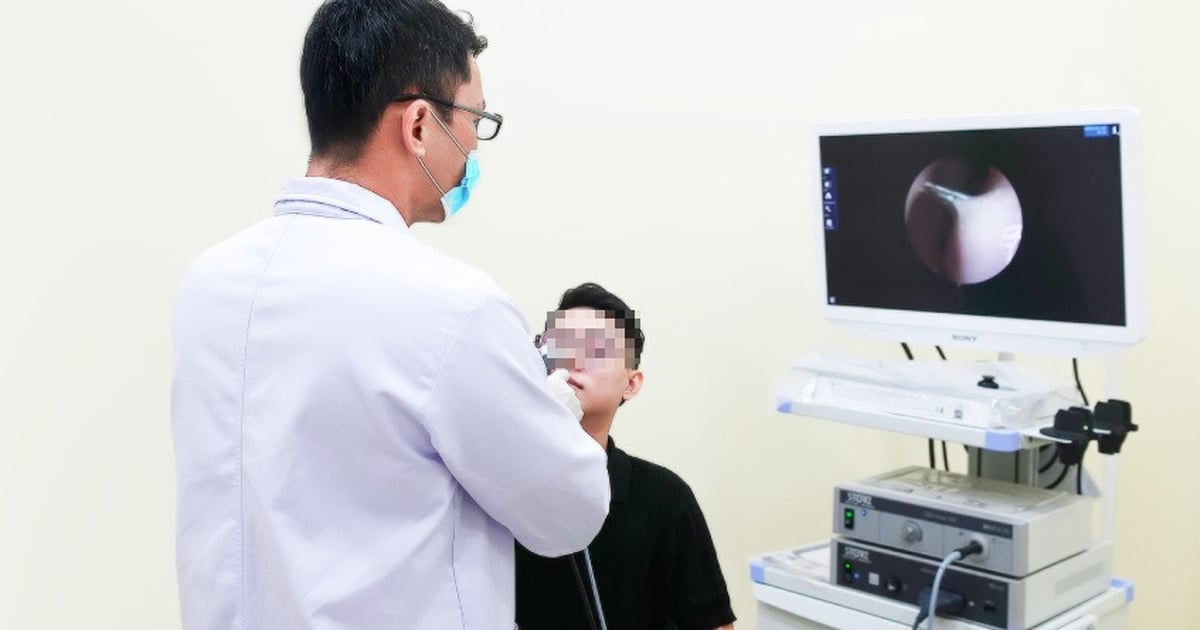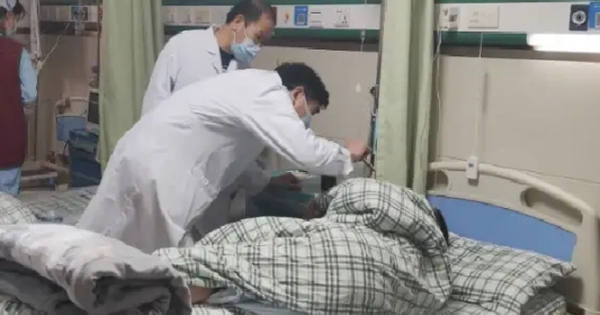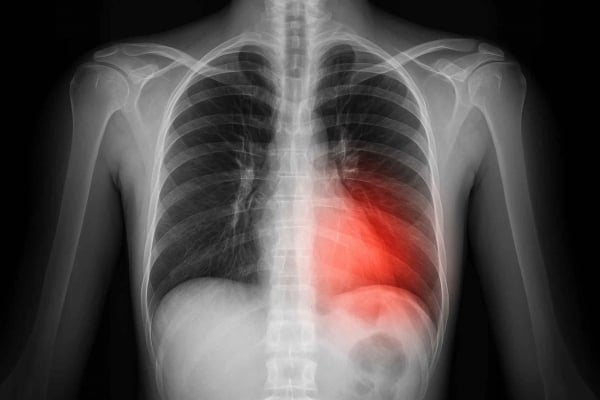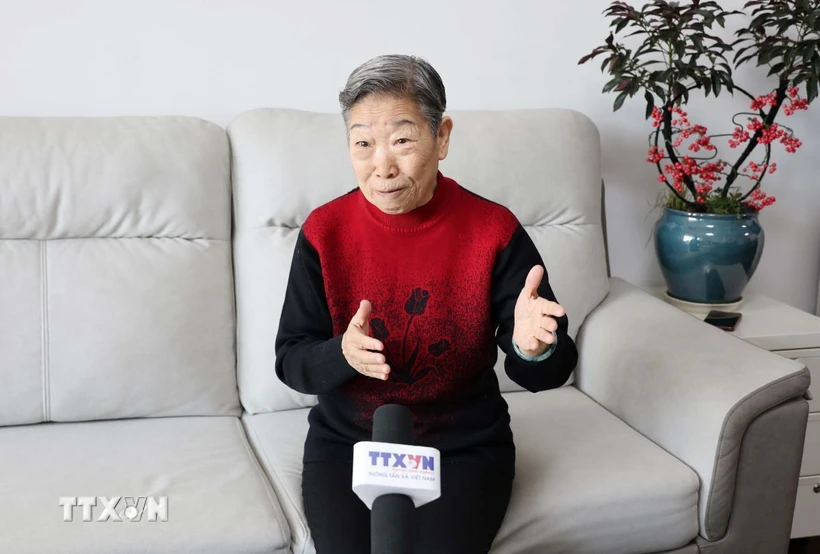Mr. B., 61 years old, had headaches and facial pain for 3 months. He went to the doctor for sinusitis and was suddenly diagnosed with nasopharyngeal cancer.
For more than 3 months, Mr. B. (in Binh Dinh) has had tinnitus, facial pain, and headaches. He had a history of sinusitis. After going to a local clinic, he was prescribed medication to treat sinusitis, but after more than a month, the condition did not improve. Worried, he traveled from Binh Dinh to Ho Chi Minh City to go to the hospital for a check-up.
 |
| The early signs of nasopharyngeal cancer are very faint, the symptoms are unclear so patients can easily confuse them with sinus diseases. |
During an ENT endoscopy, doctors discovered a tumor in the nasopharynx, suspecting cancer, so they consulted and performed a biopsy of the tumor for pathological anatomy. Histopathological examination showed that the patient had nasopharyngeal cancer.
After being diagnosed, Mr. B. was advised to transfer to the Oncology Department at Tam Anh General Hospital, Ho Chi Minh City to conduct additional clinical tests to diagnose the stage of the disease and treatment methods. The diagnosis of Mr. B. was nasopharyngeal cancer, stage 1 with localized cancer, not invading surrounding organs, no lymph node metastasis and no metastasis to distant organs.
The main treatment for nasopharyngeal cancer is usually radiation therapy. Radiation therapy uses high-energy X-rays or other types of radiation to kill cancer cells or stop them from growing by damaging their DNA.
According to doctors, nasopharyngeal cancer responds very well to radiation therapy if detected early. Early detection and early treatment have a very good prognosis.
The five-year survival rate for locally advanced nasopharyngeal cancer is 82 percent. For cancer that has spread to the lymph nodes, the rate drops to 72 percent, and for cancer that has spread to distant sites, the rate drops to 49 percent, according to the U.S. National Library of Medicine.
Because the early signs of nasopharyngeal cancer are very faint and the symptoms are unclear, patients can easily confuse it with sinus diseases.
At the same time, it is difficult to detect tumors without the support of an ENT endoscopy system. Mr. B. said that he had never had an ENT endoscopy before when he was examined locally.
ENT endoscopy is an advanced medical technique that helps doctors visually observe and access deep lesions inside the ear, nose, and throat, and assess the lesions.
From there, doctors can diagnose promptly, detect early nasopharyngeal cancer and many other ENT diseases; patients are advised to receive early treatment with more positive results.
Master Doctor CKII Tran Thi Thuy Hang, Head of the Department of Otolaryngology, Otolaryngology Center, Tam Anh General Hospital, Ho Chi Minh City said that the rate of patients who go to the Otolaryngology Center for examination and are diagnosed with nasopharyngeal cancer is about 0.1%.
Nasopharyngeal cancer is a malignant disease belonging to the group of head and neck cancers. This cancer begins in the nasopharynx - the upper part of the throat, located behind the nose and nasal cavity, which is the airway from the nose to the throat.
According to Dr. Hang, nasopharyngeal cancer can occur at any age; however, it is more common in people over 50 years old. Men tend to get nasopharyngeal cancer more than women, 2-3 times higher.
Nasopharyngeal cancer ranks 9th among the 10 most common cancers in Vietnam, accounting for 3.1%, according to Globocan 2022.
According to Cancer Research UK, there are many risk factors for nasopharyngeal cancer such as genetics, heavy smoking, heavy drinking, family history of head and neck cancer, infection with certain types of HPV, or frequent exposure to wood dust and industrial chemicals.
Doctor Hang noted that because the symptoms of early stage nasopharyngeal cancer are very vague and easily confused with sinus disease, it is often detected and treated late and progresses rapidly.
“During the examination, I met some patients who came to see me when they were already in a serious stage with symptoms of sore throat, recurrent ear infections, swollen lymph nodes in the neck, facial pain, hearing loss, and nosebleeds,” said Dr. Hang.
According to Dr. Hang, if the disease is detected early, the prognosis is good. Therefore, if you have symptoms of sore throat, stuffy nose, ear infection that do not improve after 2 weeks of treatment, you should see a doctor soon and have an ENT endoscopy.
If there are symptoms in the head and neck area, recurring continuously, and no improvement after 1-2 months of medication, an ENT endoscopy and cancer screening should be performed. In addition, everyone should have regular health check-ups and cancer screening once a year.
In addition to a healthy diet and lifestyle, limit exposure to polluted areas, avoid drinking alcohol, do not smoke; get vaccinated against HPV, and practice safe sex.
To prevent the disease, people should limit eating foods preserved with salt and nitrosamines such as salted fish and salted meat. Because these foods increase the risk of EBV infection - a virus closely related to nasopharyngeal cancer.
Source: https://baodautu.vn/ngo-mac-viem-xoang-hoa-ra-la-ung-thu-vom-hong-d224871.html

































![[Photo] "Beauties" participate in the parade rehearsal at Bien Hoa airport](https://vstatic.vietnam.vn/vietnam/resource/IMAGE/2025/4/11/155502af3384431e918de0e2e585d13a)






























































Comment (0)